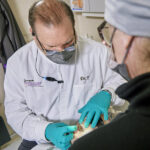Take Advantage of the Time

You may have “gained” an hour of sleep this weekend with the closure of Daylight Savings Time, but time is quickly running thin for many of my patients whose dental benefits reset on January 1st. Sadly for the population and their employers who have invested, this is a national trend, with only 2.8% of those enrolled in PPO dental plans reaching or exceeding their annual allowance, per the National Association of Dental Plans.
My most diligent patients sync their back-to-school dentist appointments with a frank conversation about their dental health, the services needed that are time-sensitive, and even evaluating care that is more discretionary than mandatory so they can schedule these appointments at ease and with plenty of options. With about eight weeks left in the year, it is not too late to visit your insurance provider’s website or call their customer service department to see what services are covered and to fit them in before the benefits you and your employer have paid into aren’t lost when the ball drops on New Year’s Eve.
For those patients with Flexible Spending Accounts (FSA), be sure to read the fine print because many offer an extended grace period beyond December 31st and some allow you to carry over money that has accumulated into the next calendar year. If you are setting up an FSA in January, be certain to take the opportunity at your next dental appointment to discuss with me what dental services we anticipate in the next twelve months so you can best budget that account.
Everyone works too hard to lose money they have invested in their dental care, or even worse, to forgo preventative and critical care simply because their insurance coverage has expired, so be certain to be vigilant, whether you are scheduling now or planning for the new year.







